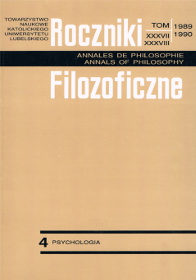Psychosocial Problems of Adolescents with Learning Disabilities
Abstract
Psychosocial problems that are the object of the present study comprise four spheres: personality, family, social and occupational ones. To put it more precisely, the study investigates intensity, conditioning and contents of the problems experienced by adolescents with learning disabilities (LD). Intensity and contents were measured with the Polish version of the Handicap problems Inventory (HPI) by G. N. Wright, H. H. Remmers á1960ñ, and the variables were recorded and evaluated by means of the Individual Chart for Disabled (KI) by T. Witkowski á1985ñ. The sample consisted of 90 subjects (adolescents) including 51 boys and 36 girls attending technical schools and revealing problems in learning at school. The results of the study are intriguing. The intensity of problems proved to be higher than the average of twelve previously investigated kinds of handicaps (mental, sensory and physical handicaps, chronic diseases, social maladjustment). The highest intensity occurs in the personality, sphere, and then in the occupational and social ones, and the lowest − in the family sphere. In all the spheres the difference between the subgroups of boys and girls proved to be significant. In a series of significant variables I would like to emphasize that the parents’ social-economic status and their education proved to be unfavourable for the problem intensity, i.e. the higher level of education was, the greater problem intensity, although it could be expected that educated parents should understand their children’s problems better. The contents of the investigated problems is concentrated around the sense of being different, the necessity to be helped by others, uncertainty and anxiety about one’s own future, difficulties in contacts with the parents and with other adolescents, fear of experiencing pity and a condescending attitude on the part of others. The present study is only a part of broad investigations into problems of people handicapped in various ways.
Copyright (c) 1990 Roczniki Filozoficzne

This work is licensed under a Creative Commons Attribution-NonCommercial-NoDerivatives 4.0 International License.





